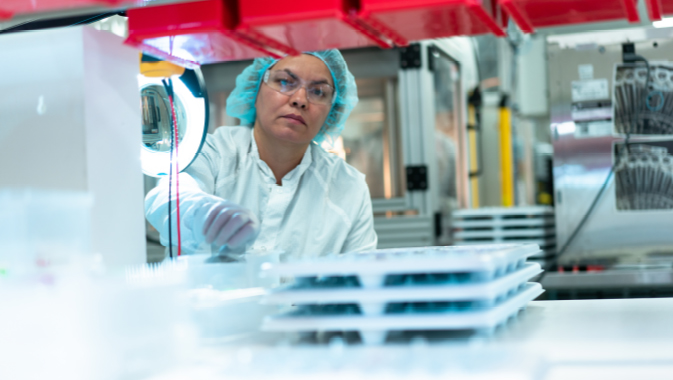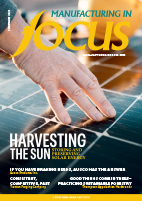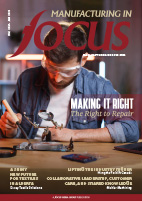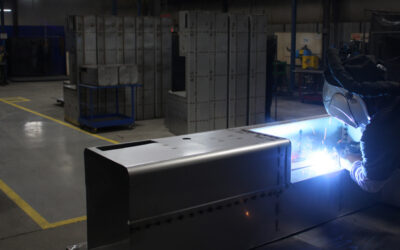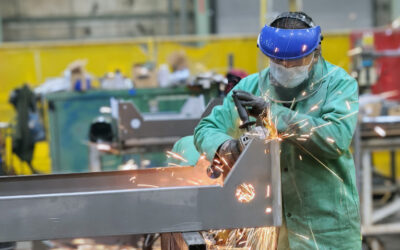Internationally recognized contract manufacturer Auer Precision Company of Mesa, Arizona specializes in high-precision tooling design and fabrication, stamped products, and close-tolerance machining.
“Our products are manufactured in the U.S. but sold to customers around the world,” states President Brent Bollong. “For medical, we focus on analytical cartridge assemblies for the medical device industry, thin-film polymer layers for semiconductor manufacturing, as well as high-precision components for leading mass spectrometry OEMs.”
While broad in scope today, the company’s operations used to be more narrowly focused. When it was founded in 1972 by brothers John and Fred Auer, most of the company’s work centered on the semiconductor sector.
“In 1972, the semiconductor industry was rapidly developing. Copper lead frames were in demand and accelerating towards greater interconnect densities. The Auer brothers – John and Fred – contributed through tool making and sales/marketing, respectively,” recalls Bollong.
Working with semiconductor companies such as Fairchild, Intel, and Motorola, Auer developed a process carrier that became a semiconductor industry standard. The carriers, in fact, acquired the nickname ‘Auer boats.’
ISO-certified Auer wants to expand its presence in the medical sector. Given the early successes as a contract manufacturer, there is every indication that the push to expand further into medical will be a success. The company has worked with clients in the life sciences, alternative energy, defense, automotive, medical, and optoelectronics sectors since it was founded. For such customers, the company offers medical diagnostic consumables, precision components, semiconductor consumables, tool design and build, and more.
While some work is subcontracted out, “We do an awful lot internally. We have all the fabrication equipment, the measurement equipment. We sub out things like plating and some heat-treat services,” says Bollong.
The firm uses computer numerical control (CNC) machines, electric discharge machines (EDM), and an array of additional equipment to manufacture parts and products. Its CNCs and other machines are networked so technicians can monitor their performance remotely. Auer makes heavy use of computer-aided design/computer-aided manufacturing (CAD/CAM) software and three-dimensional (3D) modeling techniques.
The company’s industrial division handles mechanical design, tool build, fabrication, and production. This division designs roughly 120 to 150 new products a year, most of which are “process carriers” and magazines. These products enable volume manufacturing of semiconductors, pacemakers, and defibrillators, low-emission micro-turbines and automotive electronic assemblies,” says Bollong.
Today, John Auer still works as chairman of the board. His brother, Fred Auer, is deceased. However, the brothers’ spirit of innovation continues to drive the company, which remains very keen on new technology, products, and services. The medical division that Auer is eager to grow does design work, process development, automation integration, full validation, Tier One supply chain management, and low- to high-volume manufacturing. Products produced by the medical division are mainly “consumable analytical and point-of-care devices,” continues Bollong. “We take a very collaborative approach with customers and a validation-centric approach to process development, providing unique value in bringing products to market.”
The industrial segment is ISO 9001:2015 certified while the medical division has ISO 13485:2016 certification.
The company can design and build automated systems and tooling for high-volume manufacturing. These can be used in a standalone fashion or integrated with other equipment.
Auer’s technological approach is matched by a strong sense of business savvy. The company wants to do more medical manufacturing, for example, because of the demand for rigorous quality standards and controlled manufacturing.
“Why did we decide to go after the medical business segment? The simple answer is the sheer scale of it. If you have a successful product [in the medical market], not only can the yearly demand be of a high scale, the life cycle of that product might be measured in decades. When we produce for the electronics industry, you might have a super high-demand product that lasts eighteen months before the next generation kicks it to the side, and it’s replaced,” states Bollong.
Auer Precision already has plenty of experience handling projects for medical clients. The company is particularly well-known for its work on analytical test cartridges. Such cartridges typically contain a single sample of blood from a patient and are disposed of after a one-time use. These cartridges “often comprise of multiple layers of different polymers, plastics, or glass,” says Bollong.
It has also produced “billions of stamped consumable Mylar sheets,” for “the ceramic, multi-chip, high-density interconnect business,” says Bollong, referring to a type of electronics. A high-density interconnect (HDI) packaging and multi-chip modules were leading edge at that time.
The company also built the original tooling for an early version of the LifeScan diabetic test strip. This product allows diabetic patients to self-monitor their blood glucose levels.
“A few years ago, we added a very important service – automated stations for process control and product measurement,” says Bollong. “This offering has expanded to include secure databases where process data and individual device calibration data is stored. For example, a part can be laser-marked with a unique identity. A record is created in the database, and all manufacturing data is related to that single component.”
Similarly, Auer has beefed up its internal infrastructure and capabilities. “I think our organization is now more structured to be able to support companies from cradle all the way through high-volume production. I think that’s somewhat unique for a smaller company. We have the expertise to manufacture, package and manage a supply chain – full Tier One turnkey type of services,” notes Chief Financial Officer Mike Lolli.
In keeping with this cutting-edge approach, the company acquired 3D printers a few years ago, which it primarily uses for prototyping.
Innovation is complemented by comprehensive quality control. To this end, the company utilizes Zeiss coordinate measuring machines (CMMs) and non-contact measuring equipment, among other tools, for inspection and measurement. The firm’s metrology capabilities extend to the sub-micron level.
“Our metrology is really deep. What has evolved, especially in the last two years, is the use of non-contact vision systems,” says Bollong. The company is keeping a close watch on a trend which has seen dedicated metrology systems added to individual manufacturing lines.
Auer has cleanroom facilities with humidity control that are used for some stamping operations. These cleanrooms are certified to ISO 14644 Class 5, 7, and 8 levels. “We currently have 10,000 square feet of dedicated cleanroom manufacturing space on-site, with plans to add an additional 20,000 square feet within the next six months. Our cleanrooms are used primarily for the manufacture of our medical products,” says Bollong.
The company also boasts a micro-fluid applications laboratory for testing new products and medical device designs, and this offers rapid prototyping at a reasonable cost.
In addition to its vast assortment of equipment, cleanroom, and laboratory space, Auer’s loyal, hard-working staff has been key to the company’s success. The company offers “full benefits to employees similar to [what] larger organizations offer. In addition, we financially support the continued education of our staff [and offer] apprenticeship programs for certain in-demand skills,” states Bollong.
The company’s corporate culture is “open and employee-centric. Training and sharing corporate knowledge are encouraged. It tries to be easy to work with, technically competent, and professional in all communications. We [encourage] engineers to at least try an idea and then build on success or failure, thereby developing an appetite for openness and creativity,” he continues.
It also employs the human-touch when it comes to promoting the company. “Auer has historically relied on word-of-mouth with a few annual trade shows. As a B2B organization, our work and products are our main selling features,” says Bollong.
As for the future, the company is thinking about adding a satellite plant in Mesa to augment operations. There are no plans to open branches outside of Mesa, for now at least. At some point, the firm may introduce injection molding, “a nice complementary technology for us,” says Lolli.
“As we continue to grow this company, one thing I’ve kept my eye on, is whether there is an opportunity for us to acquire a company [that does a complementary service] such as injection molding. The long-term strategy for us would be to add that service to our existing set of competencies, but that’s years down the road,” he admits.
For now, Auer wants to enhance its existing services while increasing its medical manufacturing business. “Our biggest challenge remains that we are relatively unknown as a medical device contract manufacturer,” says Bollong. “Our focus is on building out the medical side of our business before we take on any new markets.”
Beyond that, the company’s forward-looking strategy is simple. “Our goal is to preserve and continue to mature the relationships we have with clients and develop a reputation as the go-to organization for customers introducing new products to the marketplace,” notes Bollong.

